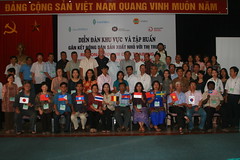Workshop Forum Summary
From June 8 – 10, 2008, women and men leaders from small farmers’ organization and cooperatives, together with partner NGOs/agri-agencies, gathered to participate in the first regional forum workshop of the Linking Small Farmers to Markets (LSFM) initiative, a project designed to respond to agricultural marketing issues through the formation of marketing intermediation mechanisms that will increase the benefit of small farmers engaging in the market that is being piloted in the Philippines, Cambodia and Vietnam. Entitled “Making Markets Work for Small Farmers: Understanding Marketing and Market Intermediation”, the workshop was designed to enhance the knowledge and skills (through experts’ inputs and sharing of actual experiences) of the participants in developing, implementing, advocating and supporting initiatives that would link small farmers to markets.
The first two sessions focused on key inputs to give an update of the current market situation in Asia and how global trends and increased competition is changing the way markets behave, and subsequently how market participants (such as small farmers) should respond. In positioning the small farmer as a participant the market, it was then important to level off on agricultural chains (what they are and how they work) and the significance of conducting a value chain analysis. Resource persons from LSFM pilot sites then shared their experiences in conducting such an analysis for free range chicken (Cambodia) and calamansi (Philippines), while Vietnam shared the results of their initial market study. A portion of the workshop was also dedicated to the formal launching of the LSFM project, which gave the project implementers a chance to thank their sponsors and partners, as well as showcase agricultural products from the three (3) pilot sites in a mini-exhibit.
The next set of sessions tackled marketing concepts, strategies and intermediation models. After a leveling off on definition of terms and concepts, case presentations from the Philippines, Korea and Vietnam were shared and discussed as concrete examples of marketing intermediation models. Each case focused on how the model works, some remaining issues and challenges, lessons learned and recommendations/plans for moving forward. As a way of synthesizing these experiences and also to enhance awareness on other models that have been applied, a presentation on emerging marketing intermediation models (their characteristics, benefits, and limitations and constraints) was also made.
As part of the following session on policy environment and support for marketing intermediation models, the participants discussed some opportunities available to farmers and farmer organizations that could be tapped for strengthening their linkage to the markets. This was done together with representatives from the ASEAN Foundation and the Food and Agriculture Organization or FAO and was followed by a workshop on defining effective marketing models or strategies and the policy support they require.
Each workshop group (first by country, then by sub-regional groupings), was asked to answer and discuss the following questions:
- Based on the experiences/cases/ models shared, what marketing model/strategy do you think can be adapted or modified given your groups capacity and market situation? (Describe the model/strategy)
- What concrete actions do you intend to undertake to adopt or implement the model or strategy? Identify other stakeholders you need to engage?
- What policy do we need to advocate towards favorable agri-marketing policy supportive of small-scale farmers? Identify what agency we need to push the said advocacy?
On the third and last day of the workshop, the participants conducted a field visit to the Province of Thai Nguyen where they got a chance to meet with the Thai Nguyen Farmer’s Union and engage farmers on-site in their green tea farms. While the farmers’ capacities in producing safe and organic green tea have been enhanced by new knowledge and technology, there are still concerns regarding quality and price setting. This is because the lack of packaging and marketing has made it difficult for consumers to distinguish the safe and organic green tea from regular green tea. The group also visited Phuc Thanh Quyet, an AsiaDHRRA project site from 2001-2005. The village leader shared the positive benefits (such as increased income, better housing, etc) their community has experienced as a result of the project.
From the participant’s feedback, it seems that the workshop achieved its objectives and was able to meet most of the group’s expectation. Many felt that they learned many things and could use the workshop materials in their own work/training sessions. Some also thought that more time should have been allotted to the discussion of the business models, as well as more concrete implementation steps in the future. There were also some recommendations on other topics that could be covered by succeeding workshops, e.g. micro-credit.
Download the workshop proceedings here....
